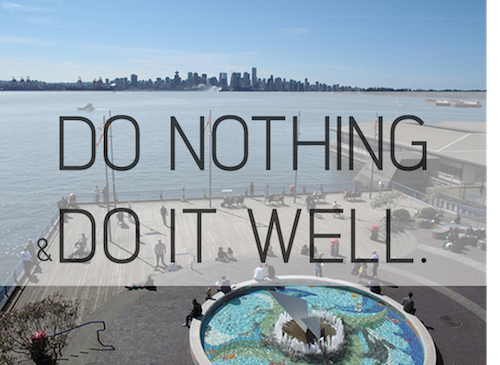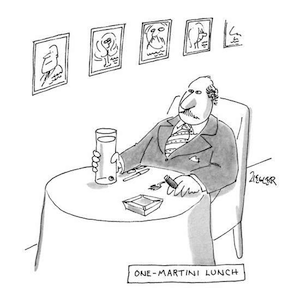LETTERS FROM THE GLOBAL PROVINCE
Slow Is Never Slow Enough, Global Province Letter, 3 October 2018
Just let the old useless chards lie in the dust. Forget the forgetful. All you have to do is make sure your main point is life’s main point, and let it shout out.—prescription for happiness from a Knoxville, Tennessee psychiatrist
Doing Nothing Well. If you peruse the Global Province at length, slowly you will find out that we have enjoined you, throughout its pages, to do nothing really well, at a snail’s pace, as often as possible, every day all day. It's our favorite theme. We are not much concerned about all the endless trivia that gluts your day. We want to hear that you can lie back and think, perhaps on a hillside, or maybe on the bank of a river stream, where the trout playing in one pool off some rocks near you, amuse themselves and you as they avoid your hook, and laugh at your lackadaisical demeanor.

We have so been dreaming about life on Satchmo’s lazy river, for four weeks now, that we have not gotten this essay down on paper yet, despite all our vows to get cracking. We figure we have been so slow, as far back as August, that the rulers of all the heavens now deem us worthy to scribble about la dolce far niente, commanding us to put white chalk hopscotch marks on the sidewalk, signs of our idleness, a tribute to what's not happening. We’re the sort that swim up river and know we will never get there.
Long Lunches. In the last century, probably till 1975 or so, businessmen had long lunches. In hustle and bustle New York City, the chaps from W.R. Grace, or Chesebrough Ponds, or Union Carbide broke bread with the fellows at Combustion Engineering, or Met Life, or Pan Am, not just to savor martinis but to learn what was happening in business around Manhattan and all over the world. But then all the big Fortune 500 companies moved out to Connecticut and the long lunches ceased. Each company had its own sterile, Formica cafeteria. The employees were caged in their cubicles, and the cross pollination with the rest of mankind ceased. Right then free enterprise got a whopping case of arthritis.

Curiously, American business began to stagnate in the 80s and 90s, just after businessmen moved into their moat-surrounded country castles. Our captains of industry began to talk more about taking costs out and cutting people to shore up profits, and much less about revolutionizing their enterprises. They became much too busy with incremental small thoughts to bother inventing big tomorrows. General Electric got on the path to failure, as it became littered with every sort of business and every sort of trend, a mindless conglomerate, much over-rated by the financial community.
Inertia sets in when you can't take time to ponder and become too busy to find out what's happening outside of the company walls. Is it any wonder that digital telephones have captured our souls and made us mindless, when we have had no choice but to wall ourselves away from the great out there and become addicted to digital reality which, of course, is a contradiction in terms, the ultimate oxymoron?
We have to get on a slow boat if we are to have creativity and to sculpt a strategy that gets us beyond the present. It is all very nice to turn off our TV, and computer, and cellphone, but how do we really get ourselves slowed down? We have a host of clients who vow to us that they are getting on a slow train, but as near as we can see they are still as overscheduled as ever, propelled by a technocracy that has turn them into automatons.
Twenty is Plenty in Sconset. Before investment bankers ran Nantucket into the ground, vacationers genuinely slowed down on that fabled island. We ourselves still sport "20 is Plenty in Sconset" on our car fenders though we have had to retire from that too much, too big, too crowded island. But it is good to hang out in places that remind you to take your foot off the pedal. Which brings us to the question of how do you slow down in a society that does not know how.
It helps, for starters, to speak a different language. Our daily discourse has been taken over by the advertising boys who shout meaningless words at us over the TV: our language has ceased to be a medium of civilized discourse. Resort to poetry instead of prose: one will speak slower and reflect on the words. For instance, consider how thoughtful we can be about nothing by reciting Neruda's "Keeping Quiet: Ode to Silence.”
Now we will count to twelve
and we will all keep still.For once on the face of the earth,
let's not speak in any language;
let's stop for one second,
and not move our arms so much.It would be an exotic moment
without rush, without engines;
we would all be together
in a sudden strangeness.Fisherman in the cold sea
would not harm whales
and the man gathering salt
would look at his hurt hands.Those who prepare green wars,
wars with gas, wars with fire,
victories with no survivors,
would put on clean clothes
and walk about with their brothers
in the shade, doing nothing.What I want should not be confused
with total inactivity.
Life is what it is about; I want no truck with death.If we were not so single-minded
about keeping our lives moving,
and for once could do nothing,
perhaps a huge silence
might interrupt this sadness
of never understanding ourselves
and of threatening ourselves with death.
Perhaps the earth can teach us
as when everything seems dead
and later proves to be alive.Now I'll count up to twelve
and you keep quiet and I will go.
Indeed, the language of poetry can slow us down and make us more thoughtful.
Ceremonies of Silence. Not only can we talk slower, but we can take up rituals that make us slower. Throughout Asia, people embrace the Tea Ceremony, which is paced to produce harmony. In Latin America, particularly in Argentina and Brazil, vast numbers of people drink mate together in a very stylized and comfortable ritual, achieving a closeness of two people partaking from one cup. Increasingly in the Western World, people who want to slow down are taking up meditation to get off the fast track.
Emptiness. Sunyata, a Buddhist concept, teaches us the emptiness of all the things that crowd into our daily life. Nicolas Vreeland comments:

Perhaps the chief difference between Buddhism and the world's other major faith traditions lies in its presentation of our core identity. The existence of the soul or self, which is affirmed in different ways by Hinduism, Judaism, Christianity, and Islam, is not only firmly denied in Buddhism; belief in it is identified as the chief source of all our misery. The Buddhist path is fundamentally a process of learning to recognize this essential nonexistence of the self, while seeking to help other sentient beings to recognize it as well.
This concept can equip us philosophically to practice slowness, as we sense that we exist only as we relate to others, not as heroic actors pursuing separate destinies, all our swift moves taking us nowhere.
The Sloth and the Slug. A sloth and a slug met each other in the forest. Whereupon the slug beat the devil out of the sloth. The sloth went to the nearest police station, and reported this violent crime. The police asked, "Can you tell us what he looked like? Did he say anything? What was he wearing?" The sloth replied, "I know nothing. It all happened too fast!" We are instructed to slow down a bit, if we are to know what is happening, and if we are to know what has happened to ourselves.
As Proust did say "There is, following an ample meal, a sort of pause in time, filled with a gentle slackening of thought and energy, when to sit doing nothing gives us a sense of life's richness and a feeling that the least effort would be intolerable. The melancholy we took with us to table has disappeared and, if we think of it at all it is only to smile, as at some black mood now past, its cause having gone. And with the melancholy, all scruple, all remorse departs from us."
If we are always too much in motion, then we are doomed to know almost nothing, and to suffer dejection and indigestion after every meal.
P.S. In Praise of Cantering Long Lunches. To learn how to eat righteously, see "The Longest Lunch Breaks Around the World," and "A Plea for Longer Lunches."
P.P.S. Back when thought was still celebrated at Yale University, it was home to a truly great philosopher, who spoke softly and was not that celebrated on campus We always neglect the greats because they talk softly. His name was Robert Sherrick Brumbaugh, and he was celebrated in the philosophic community for his overwhelming understanding of the Greek philosophers and his ability to show, as a whole, how they set the stage for all the strands of modern Western philosophy. Even more intriguing to us, he mapped out all the different kinds of time that governed men’s lives. We would just suggest that our concept of “slow” is just a metaphor for a useful kind of time that allows mankind to pursue effectively creativity and strategy. Brumbaugh made us see the uses of several of several ideas of time. Each of us, in our lives, must get the time straight.
This book recognizes and questions a key assumption about time which is shared by common sense and philosophy—the assumption that time, like a single substance or a homogeneous quality, is subject to the law of contradiction. This leads to the logical conclusion that among different and mutually exclusive accounts of time, whether in science, practical action, or fine art, only one can be the “right” one. Four such accounts are shown here to be internally consistent though mutually incompatible, suggesting that the initial assumption is mistaken, and that in some way each alternative concept of time must be incomplete. Brumbaugh suggests that we must choose the one appropriate to a particular purpose: artistic creation, technological efficiency, discovery of mathematical laws of nature, or work with biological and social phenomena. The selection should allow coherence between that aspect of reality which the selected time concept emphasizes, and the aspect of reality most relevant to a successful execution of our purpose. —Unreality and Time. Robert S. Brumbaugh
Home - About This Site - Contact Us
Copyright 2018 GlobalProvince.com